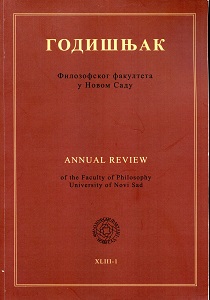КАЛЕНДАРСКО ЗНАЊЕ И АГРАРНИ КАЛЕНДАР У СРПСКИМ ОБРЕДНИМ ПЕСМАМА
CALENDAR KNOWLEDGE AND THE AGRARIAN CALENDAR IN SERBIAN RITUAL FOLKSONGS
Author(s): Dragoljub Ž. PerićSubject(s): Language and Literature Studies, Studies of Literature, Serbian Literature
Published by: Филозофски факултет, Универзитет у Новом Саду
Keywords: ritual folksongs; folklore temporology; agrarian calendar; solar calendar; myth; tradition; cyclic renewal
Summary/Abstract: The transition to agriculture as a main form of economic development necessitated an improvement in traditional measuring of time. Therefore, the lunar calendar was replaced by the solar one, in which periods of the year (summer and winter half-year) were determined on the basis of four key positions of the Sun – Winter Solstice, two equinoxes and Summer Solstice. These moments of the annual cycle were Christianized and associated with certain Christian saints, whose order of celebration gave order to field work as well. The songs discussed in the paper follow all segments of public life, from winter rites (the koledar procession), in which the dominant magical actions were those related to the growth of the seeds (together with the dance, koledars sing, „jump, jump, koledo, for the wheat to grow this tall”), to the songs of spring circle, where the singers bestow agricultural blessings and perform magical acts to „close the winter” and „open the summer”, along with spring fieldwork. The life cycle of a seed starts with the plowing and the sowing and finishes with the collective harvest (moba). These songs keep vestiges of the ancient belief that man can benefit only from the work that is done right, by respecting the time for work, i.e. respecting the taboo regulations related to certain days, when work is avoided.
Journal: Годишњак Филозофског факултета у Новом Саду
- Issue Year: 43/2018
- Issue No: 1
- Page Range: 485-501
- Page Count: 18
- Language: Serbian

